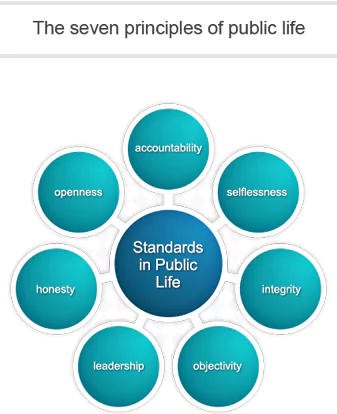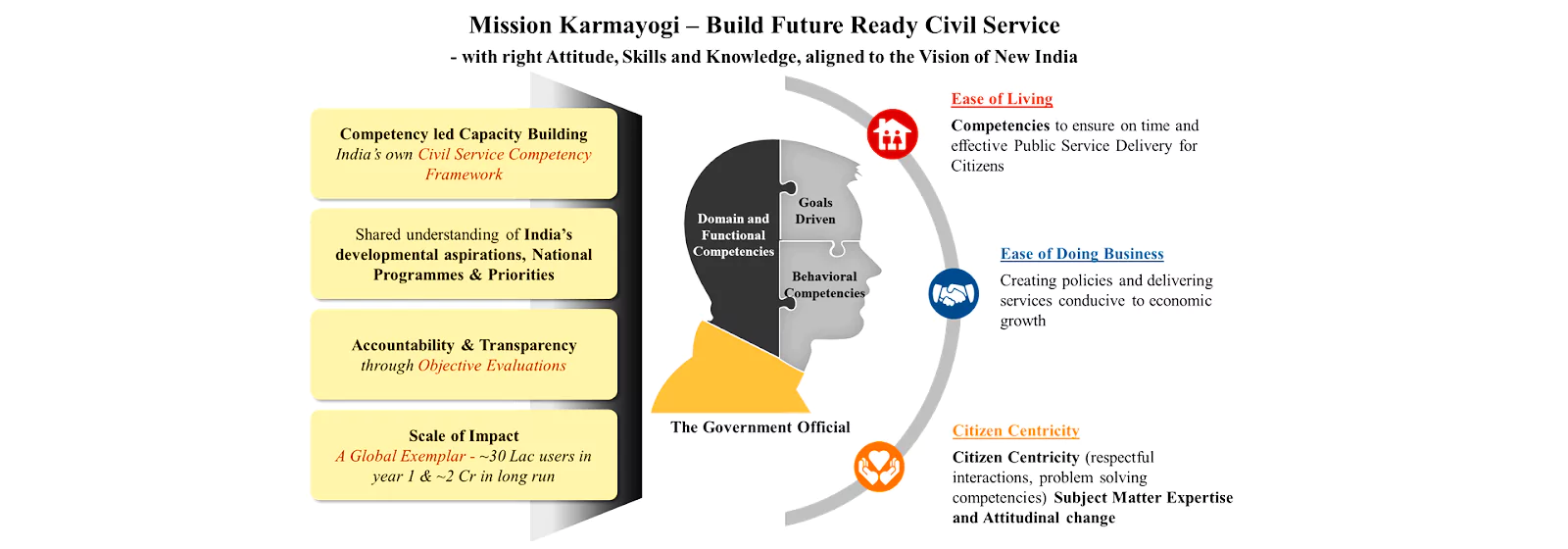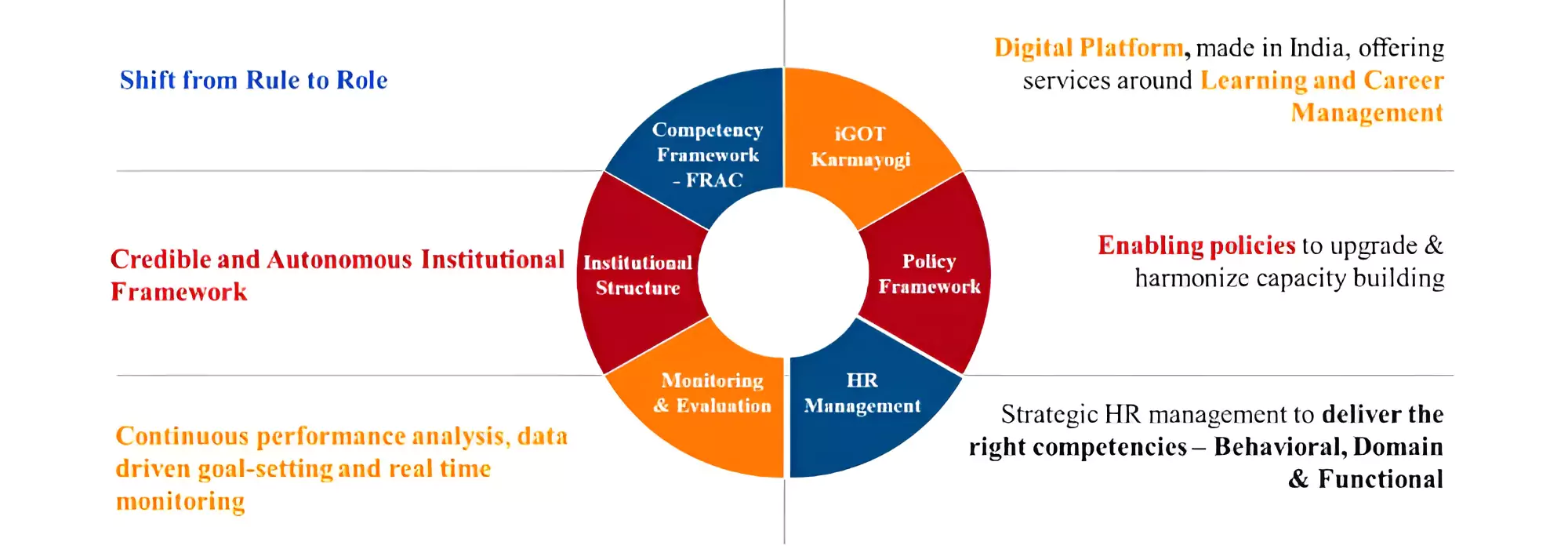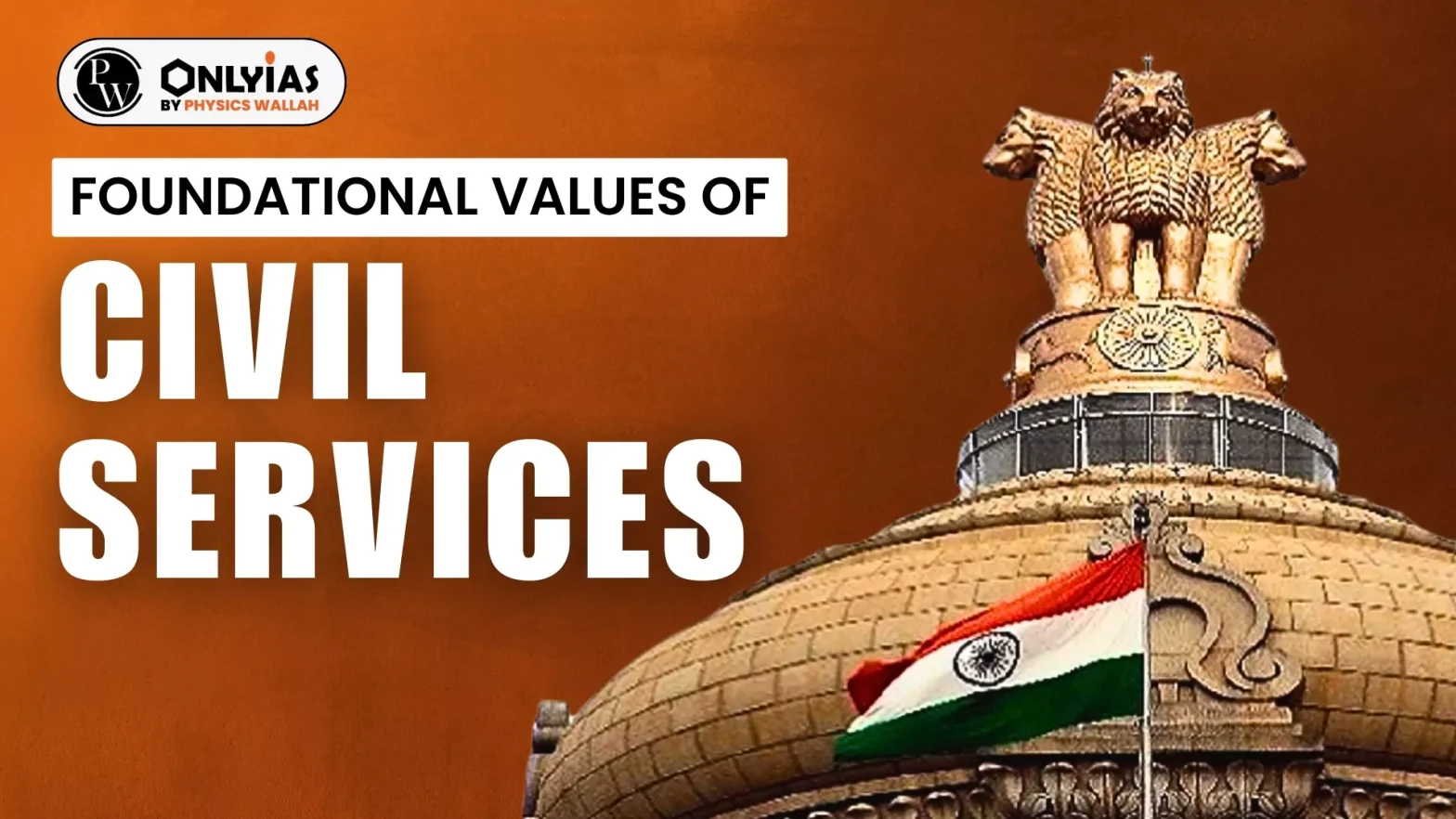Addressing the Assistant Secretaries of IAS 2022 batch at Vice-President’s enclave, the Vice President of India urged the civil servants to uphold highest ethical principles.
Foundational Values Of Civil Services- Crucial Insights on Vice-President’s Addressal

- High & Inclusive Representation: He noted the representation from all societal segments, particularly those from vulnerable, marginalized, and underprivileged backgrounds.
- Importance: Civil servants are a conduit for change, vital stakeholders in quality governance, and torchbearers for accelerated growth.
- Appeal to Officers:
- To never stop learning and to keep updating their skills.
- Civil servants cannot ingratiate themselves with political dispensations.
- Adopt a nationalistic, federalist outlook, always keeping the interest of the nation supreme and upholding the rule of law.
- The Rule of Law: It means that all laws apply equally to all citizens of the country and no one is above the law.
- Civil servants should always see things beyond the partisan approach.
Enroll now for UPSC Online Course
Modern Civil Services in India
- Introduction: The civil service system was introduced in India by the East India Company for its benefits. Implementing Macaulay’s Report 1835 brought significant changes in British India’s civil services.
- Lord Cornwallis was the first to establish and organize the Civil Services.
- Lord Wellesley established Fort William College in 1800 to train new recruits.
- The Government of India Act, 1935 proposed the formation of a Federal Public Service Commission and a Provincial Public Service Commission within their respective spheres.
- All India Services: There are three All India Services – the Indian Administrative Service, the Indian Police Service and the Indian Forest Service.
- These are selected by the central government, with officers allotted to various state cadres.
- The Centre then gets a certain percentage of officers from each state on central deputation. These bureaucrats work directly for the Centre.
- All India Services are governed by Article 312 of the Constitution of India.
- Central Civil Services: Other services are called Central Civil Services. These services are under the central government itself with no state cadre system.
- They include services such as the Indian Foreign Service, the Indian Revenue Service, Customs and Central Excise Service and several others.
- Rules Applicable: There are two sets of rules for civil servants – one for All India Services (AIS) and the other for Central Civil Services (CCS). Specially designed Conduct Rules govern an officer’s behavior and conduct.
- The AIS Conduct Rules, 1968 and CCS Conduct Rules, 1964 are mostly similar.
- These were framed based on recommendations from a 1962 committee constituted by then-Minister of Home Affairs Lal Bahadur Shashtri.
- This Committee on Prevention of Corruption was headed by K Santhanam, Member of Rajya Sabha.
|
Important Characteristics of a Civil Servant
- Impartiality: It asserts treating all individuals or groups equally and without any internal or external influences. It’s a path that is more consistent with moral intent and moral reasoning.
- A Qualitative Value: Impartiality is a qualitative value and expects the decision maker to be unbiased, and just. Civil servants need to treat the community as human beings and there is no space for favoritism.
- The feelings of caste, class, religion, benefits, and preferences have no space in the reasoning of such kinds of civil servants.
- Integrity: It is the quality of having uncluttered moral convictions and an iron will to abide by these in conduct at all levels and interactions in life.
- It refers to the consistent upholding of honesty and highest ethical standards in actions, crucial for building trust among the weaker sections.
- Example: Ashok Khemka, an IAS officer, is known for his integrity, having been transferred multiple times for challenging corruption and upholding ethical standards in public service.
- The decision making or action of a public servant affects the welfare of a large number of people and also one has to deal with large amounts of public funds, it is important to have a high degree of integrity.
Check Out UPSC Modules From PW Store
- Associated Reform Committees: To address various issues faced by civil servants and maintain integrity and discipline amongst civil servants, various reform committees have been formed such as:
- The Santhanam Committee (1964)
- Alagh Committee on Recruitment and Selection Procedures (2001)
- Surinder Nath Committee on Performance Appraisal, Promotion, Empanelment and Placement for the All India Services and other Group ‘A’ Services (2003)
- Yugandhar Committee on In-Service Training (2003)
- Hota Committee (2004)
- The Second Administrative Reform Committee Report (2005)
|
- Connection between Impartiality & Integrity: A person with impartial conduct creates an image of the highest form of integrity and can act as a role model and provide proper leadership which is always expected from public servants.
- Governance is a public service that can only remain green if the travelers remain integral to impartiality.
|
- Empathy and Compassion: It involves understanding and addressing the specific needs and challenges of marginalized groups.
- Example: The work of IAS officer Armstrong Pame, known for initiating the “People’s Road” in Manipur by mobilizing resources and community support to build a 100-km road in a remote area reflects these values.
- Equity: It ensures that all individuals, especially the disadvantaged, have fair access to resources and opportunities.
- Example: The Right to Education Act in India, which mandates free and compulsory education for children, demonstrates a commitment to equity, aiming to level the educational playing field for underprivileged children.
- Social Justice: It is the commitment to reducing inequality and improving the welfare of underprivileged sections.
- Example: The Scheduled Castes and Scheduled Tribes (Prevention of Atrocities) Act, 1989, in India, represents a commitment to social justice, seeking to prevent discrimination and violence against marginalized communities.
- Inclusiveness: Ensuring that all segments of society, especially marginalized groups, are included in the development process.
- Example: The efforts of IAS officer Pranjal Patil, India’s first visually challenged woman IAS officer, in promoting inclusivity and accessibility in public services for people with disabilities, embody this value.
- Honesty: It is the ability to tell the truth and be transparent in dealings.
- Example: IAS officer Tukaram Munde, known for his honesty and transparency in carrying out his duties.
- Objectivity: It is the ability to make decisions based on evidence and facts, rather than personal biases or interests.
- Example: The Election Commission of India, which operates independently to ensure free and fair elections.
- Accountability: It is the ability to take responsibility for actions and decisions.
- Example: Municipal Corporation of Greater Mumbai, which has set up a mechanism for citizens to hold officials accountable for their actions.
Check Out UPSC NCERT Textbooks From PW Store
- Transparency: It is the ability to provide information and be open in dealings.
- Example: Central Information Commission, which ensures transparency in government processes by providing citizens the right to access information.
- Respect for Diversity: It is the ability to value and respect differences in culture, ethnicity, and religion.
- Example: IAS officer Rohini Sindhuri Dasari, who organized a cultural festival to promote diversity in her district.
- Professionalism: It is the ability to maintain high standards of conduct and behavior.
- Example: Indian Police Service officer Kiran Bedi, known for her professionalism and dedication to public service.
- Loyalty to the Constitution and the Nation: It is the ability to prioritize national interests over personal or political interests.
- Example: Former President of India Dr. A.P.J. Abdul Kalam, who was known for his loyalty to the nation and his commitment to its progress and development.
- Dedication to Public Service: It is the ability to serve the public interest with sincerity and commitment.
- Example: IAS officer K. Vijayendra Pandian, who worked tirelessly to improve public service delivery in his district.
- Commitment to Ethical Behavior & Principles: It is the ability to follow ethical principles and values in all actions and decisions.
- Example: Indian Administrative Service officer Pradeep Singh, who scored the first rank in the UPSC civil services examination in 2019 and credited his success to his commitment to ethical behavior and principles.
Enroll now for UPSC Online Classes
What according to Patel should be the important characteristics of a civil servant of free India?
- Equality: Civil servants’ duty should be to treat the common man in India as their own.
- Adaptability: Civil servants of free India will have to adapt themselves to the democratic ways of administration.
- Discipline: Civil servants should be disciplined.
- An esprit de corps: A civil servant must cultivate an esprit de corps. It means to have a shared feeling of pride among team or group members.
- Without it, a Service as such has little meaning. A civil servant should regard it as a proud privilege to belong to the Service, covenants of which he/she will sign, and to uphold throughout his/her service its dignity, integrity and incorruptibility.
|
The Nolan Committee’s Seven Principles of Ethical Conduct

- In 1994, the UK government established the Committee on Standards in Public Life. The committee was chaired by Lord Nolan, and was tasked with making recommendations to improve standards of behavior in public life.
- The first report of the committee established the seven principles of public life, also known as the “Nolan principles”.
- Selflessness: Holders of public office should not do so in order to gain financial or other benefits for themselves, their family or their friends.
- Integrity: Holders of public office should not place themselves under any financial or other obligation to outside individuals or organizations that might seek to influence them in the performance of their official duties.
- Objectivity: In carrying out public business, including making public appointments, awarding contracts, or recommending individuals for rewards and benefits, holders of public office should make choices on objective criteria.
- Accountability: Holders of public office are accountable for their decisions and actions to the public and must submit themselves to whatever scrutiny is appropriate to their office.
- Openness: Holders of public office should be as open as possible about all the decisions and actions they take. They should give reasons for their decisions and restrict information only when the wider public interest clearly demands.
- Honesty: Holders of public office have a duty to declare any private interests relating to their public duties and to take steps to resolve any conflicts arising in a way that protects the public interest.
- Leadership: Holders of public office should promote and support these principles by leadership and example.
|
Challenges faced by Civil Servants in India
- Political Interference: Civil Servants often face pressure from elected officials to make decisions that benefit them or their allies, rather than following the law or best practices. This can create a conflict of interest and make it difficult for officers to do their jobs effectively.
- Work-Life Balance: Civil service careers, especially for IAS and IPS officers in their initial postings, often involve long hours and frequent transfers. This can strain personal relationships and make it difficult to maintain a healthy work-life balance.
- Lack of Infrastructure and Resources: Many Indian districts, particularly in rural areas, lack proper infrastructure and resources. This can make it challenging for IAS officers to implement government programs and deliver services effectively.
- Public Pressure and Expectations: Civil servants are expected to solve complex problems and meet the needs of a large and diverse population. This can be a daunting task, and officers may face criticism from the public if they are unable to meet these expectations.
- Corruption: India continues to grapple with corruption, and civil servants are sometimes pressured to engage in corrupt practices or turn a blind eye to them. This can be a moral dilemma for officers who want to uphold the law.
- Red Tape and Bureaucracy: Navigating complex bureaucratic procedures can be time-consuming and frustrating for civil servants. This can slow down progress and make it difficult to implement change.
- Personal Security Threats: For Civil Servants, especially for IPS officers, there can be situations where their work puts them at risk of violence or threats from criminals or extremists.
- Limited Autonomy: Decisions made by civil servants often need approval from higher authorities, which can limit their autonomy and ability to be responsive to local needs.
- Accountability and Transparency: Concerns exist around a lack of clear and transparent accountability mechanisms for civil servants, making it difficult to address negligence or misconduct.
Check Out UPSC CSE Books From PW Store
Regulations on Civil Servants
- Code of Conduct for Civil Servants:
- Conduct Rules: In the 1930s, a collection of instructions containing “do’s and don’ts” was published under the title “Conduct Rules.”
- The All India Services (AIS) Rules: These Rules in 1955, separated the compendium into separate rules.
- The Santhanam Committee (1964) recommended significantly broadening such rules, which resulted in the 1964 version. These rules were later revised to incorporate additional behavioral norms.
- According to the All India Services (Conduct) Rules, 1968, every member of the service shall maintain:
- Integrity & Honesty
- Political Neutrality
- Promoting of the principles of merit, fairness and impartiality in the discharge of duties
- Accountability & Transparency
- Responsiveness to the public, particularly to the weaker section
- Courtesy and good behavior with the public
- Containing Norms: The Conduct Rules contain some general norms such as “maintaining integrity and absolute devotion to duty” and not engaging in “conduct unbecoming of a government servant.
- The Code of Conduct is generally aimed at cataloging specific activities deemed undesirable for government servants.
- There has recently been a concern that more “generic norms” should be added to the list of acceptable conduct.
- Code of Ethics for Civil Servants:
- In India, there is no code of ethics for civil servants, though such codes exist in other countries.
- India has a number of conduct rules that prohibit a variety of common activities. These conduct guidelines serve a purpose, but they are not a code of ethics.
- Public Service Bill: A draft “Public Service Bill” proposed by the Ministry of Personnel, Public Grievances, and Pensions in 2007.
- Deals With: It seeks to establish a set of generic expectations of civil servants known as “values.” The following are the key “values” envisioned in the Bill:
- Allegiance to the various ideals enshrined in the Preamble to the Constitution
- Apolitical functioning
- Good governance for the betterment of the people to be the primary goal of civil service
- Duty to act objectively and impartially
- Accountability and transparency in decision-making
- Maintenance of the highest ethical standards
- Merit to be the criteria in the selection of civil servants consistent, however, with the cultural, ethnic and other diversities of the nation
- Ensuring economy and avoidance of wastage in expenditure
- Provision of a healthy and congenial work environment
- Communication, consultation and cooperation in the performance of functions, that is the participation of all levels of personnel in management
- Other Provisions:
- Various Codes: The draft Bill also includes provisions for a public service code and a public service management code, which define more specific duties and responsibilities.
- Public Service Authority: It is also envisaged to oversee the implementation of the code and the values mentioned above, as well as to provide advice on the values and the code.
- Provision of Penalty: Violations of the code would result in penalties similar to the current major and minor penalties imposed by the heads of institutions and organizations.

Ways to Prevent Unethical Behavior in Public Servants
- Training & Education: The Government of India has launched several training and education programs for public servants, such as the mandatory online training on ethics and integrity for all IAS officers.
- Example: The National Programme for Civil Services Capacity Building (NPCSCB) (Mission Karmayogi): Anchored by an apex body and headed by the Prime Minister, it is designed to enhance the civil services under a national programme.
- iGOT Karmayogi: It is an online learning platform being developed as an integral part of the Digital India stack for capacity building of all government employees.
- It will provide ‘anytime-anywhere-any device’ learning to train around 2.0 crores users which was so far unachievable through traditional measures.
 Need to Strictly Follow the Code of Conduct: The Central Civil Services (Conduct) Rules, 1964, outline the ethical behavior expected of all public servants in India.
Need to Strictly Follow the Code of Conduct: The Central Civil Services (Conduct) Rules, 1964, outline the ethical behavior expected of all public servants in India.- Monitoring & Enforcement: The Central Vigilance Commission (CVC) is an independent body that monitors and enforces ethical behavior in government agencies and public servants.
- Whistle-blower Protection: The Whistle-blower Protection Act, 2014, provides protection to whistle-blowers who report corruption or malpractices in government agencies.
- Transparency & Accountability: The Right to Information Act, 2005, promotes transparency and accountability in government processes by allowing citizens to access government information.
- No Political Affiliation: Members not allowed to be part of, assist political parties.
- Rule 5(1) of AIS states, “No member of the Service shall be a member of, or be otherwise associated with, any political party or any organization which takes part in politics, nor shall he take part in, or subscribe in aid of, or assist in any other manner, any political movement or political activity.”
- While members can hold personal political beliefs, these rules restrict the degree to which they can act on them.
- Strict Prohibition on Dowry: As far as rules are concerned, both giving and receiving dowry is strictly prohibited.
- As per Rule 11 (1-A) of the AIS, “No member of the Service shall— (i) give or take or abet the giving or taking of dowry; or (ii) demand, directly or indirectly, from the parents or guardian of a bride or bridegroom, as the case may be, any dowry.”
- In fact, any “big” gift a civil servant receives needs to be reported.
- Strict Enforcement of the Provisions for Heavy Penalties: Transgressions can attract two kinds of penalties — major and minor. Major penalties can include “dismissal” from the service as well.
Enroll now for UPSC Online Course
Conclusion
Going ahead, the reinforcement and practice of foundational values like integrity, empathy, equity, social justice, and inclusiveness are imperative for the evolution of a more effective and equitable public administration. These values not only guide civil servants in serving the weaker sections of society but also ensure a robust, transparent, and inclusive governance framework for the future.
![]() 4 Jun 2024
4 Jun 2024



 Need to Strictly Follow the Code of Conduct: The Central Civil Services (Conduct) Rules, 1964, outline the ethical behavior expected of all public servants in India.
Need to Strictly Follow the Code of Conduct: The Central Civil Services (Conduct) Rules, 1964, outline the ethical behavior expected of all public servants in India.